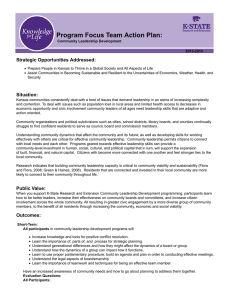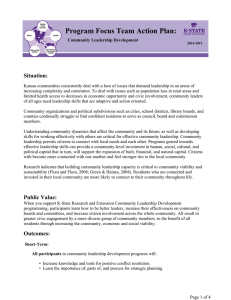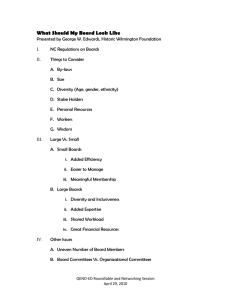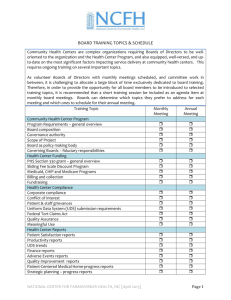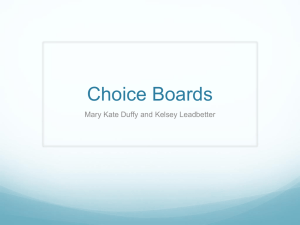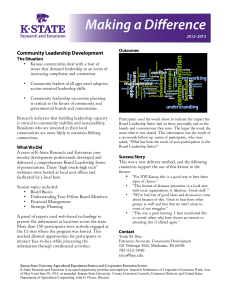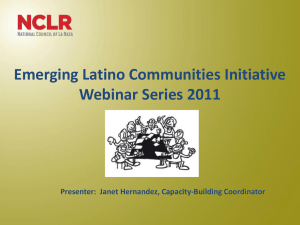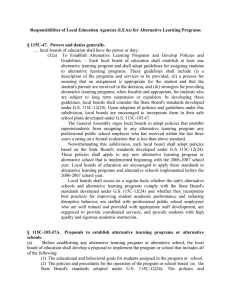Community Leadership Development Situation Program Focus Team Action Plan
advertisement
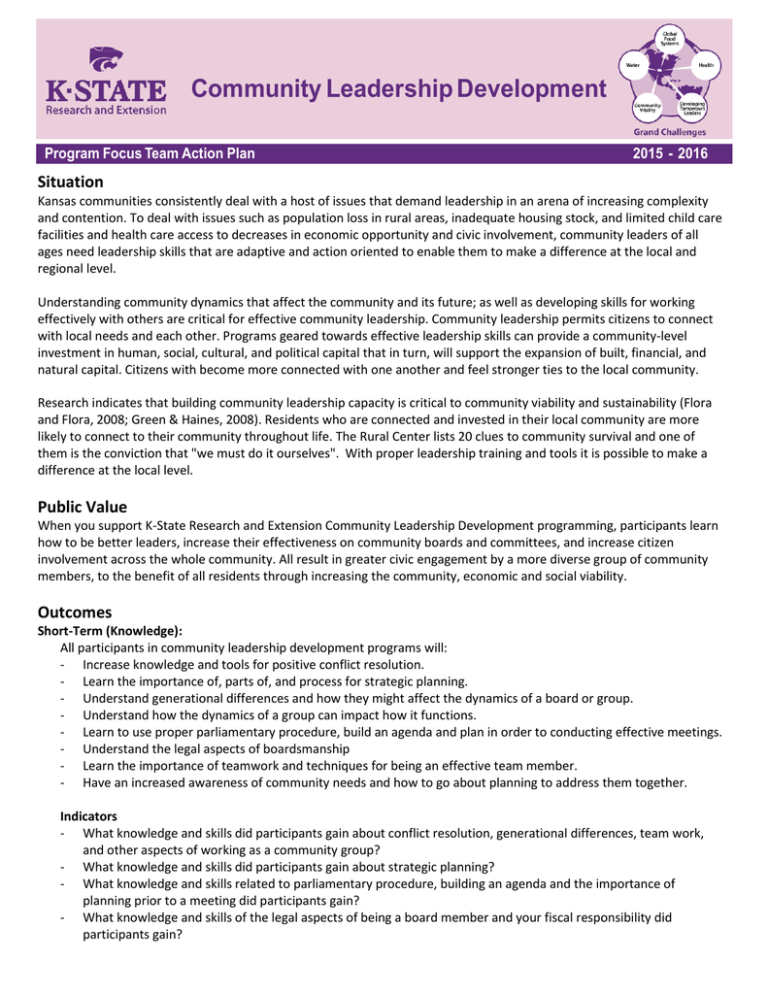
Community Leadership Development Program Focus Team Action Plan 2015 - 2016 Situation Kansas communities consistently deal with a host of issues that demand leadership in an arena of increasing complexity and contention. To deal with issues such as population loss in rural areas, inadequate housing stock, and limited child care facilities and health care access to decreases in economic opportunity and civic involvement, community leaders of all ages need leadership skills that are adaptive and action oriented to enable them to make a difference at the local and regional level. Understanding community dynamics that affect the community and its future; as well as developing skills for working effectively with others are critical for effective community leadership. Community leadership permits citizens to connect with local needs and each other. Programs geared towards effective leadership skills can provide a community-level investment in human, social, cultural, and political capital that in turn, will support the expansion of built, financial, and natural capital. Citizens with become more connected with one another and feel stronger ties to the local community. Research indicates that building community leadership capacity is critical to community viability and sustainability (Flora and Flora, 2008; Green & Haines, 2008). Residents who are connected and invested in their local community are more likely to connect to their community throughout life. The Rural Center lists 20 clues to community survival and one of them is the conviction that "we must do it ourselves". With proper leadership training and tools it is possible to make a difference at the local level. Public Value When you support K-State Research and Extension Community Leadership Development programming, participants learn how to be better leaders, increase their effectiveness on community boards and committees, and increase citizen involvement across the whole community. All result in greater civic engagement by a more diverse group of community members, to the benefit of all residents through increasing the community, economic and social viability. Outcomes Short-Term (Knowledge): All participants in community leadership development programs will: - Increase knowledge and tools for positive conflict resolution. - Learn the importance of, parts of, and process for strategic planning. - Understand generational differences and how they might affect the dynamics of a board or group. - Understand how the dynamics of a group can impact how it functions. - Learn to use proper parliamentary procedure, build an agenda and plan in order to conducting effective meetings. - Understand the legal aspects of boardsmanship - Learn the importance of teamwork and techniques for being an effective team member. - Have an increased awareness of community needs and how to go about planning to address them together. Indicators - What knowledge and skills did participants gain about conflict resolution, generational differences, team work, and other aspects of working as a community group? - What knowledge and skills did participants gain about strategic planning? - What knowledge and skills related to parliamentary procedure, building an agenda and the importance of planning prior to a meeting did participants gain? - What knowledge and skills of the legal aspects of being a board member and your fiscal responsibility did participants gain? Medium-Term (Behavior) All Participants and Groups/Boards in community leadership development programs will: - Demonstrate conflict resolution skills. - Develop or revise a strategic plans. - Seek out and have representation from a variety of age groups, and have respect for diverse voices. - Act in a respectful manner towards other members of the group. - Understand and use parliamentary procedure, set and use an agenda and conduct more effective meetings. - Practice ethical and legal behaviors. - Practice good communication (talking and listening) skills. - Practice skills to identify community needs. - Seek out opportunities for leadership. Indicators All Participants or Groups/Boards: - Do groups report less conflict at meetings, diverse membership, and more effective, results-oriented meetings? - Do groups report creating or revising strategic plans? - Do groups report less legal and ethical issues? - Do groups report that members practice improved communication skills? - Do groups report improved ability to identify community needs? - Do group members report that they seek out additional leadership roles within the community? Long-Term (Change in Condition) Groups/Boards: - Membership on boards and committees is sustained. - Representation on board and committees is expanded. - Members serve longer on boards and committees. - Civic groups/community boards report an increase in effectiveness of leadership and progress towards group goals. Communities: - Increased diversity among volunteer base. - Community improvements that represent the needs of current and future residents. - Community vitality that attracts young people and families to the community. - Sustainable community improvement process. Indicators All Participants or Groups/Boards: - How many community groups have been sustained? - How many groups are involved in participatory community planning? - How many boards or committees have partnered with others? - How many participants in leadership development programs report broader community involvement? Outputs Program - Community Leadership Programs Program - Kansas PRIDE Program Training - Board Leadership Series: So You Are Serving on a Board-Now What? Training-First Impressions Community Assessment Tool Kansas State University Agricultural Experiment Station and Cooperative Extension Service. K-State Research and Extension is an equal opportunity provider and employer
